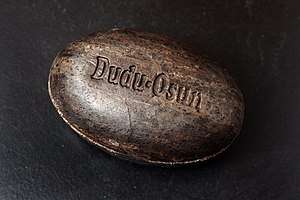African black soap
African black soap, or black soap (also known by various local names such as sabulun salo, ose dudu and ncha nkota), is a kind of soap originating in West Africa. It is made from the ash of locally harvested African plants and dried peels, which gives the soap its characteristic dark colour.[1][2] Black soap has become a popular toiletry product in North America due to its benefits on oily and acne-prone skin.[3] In West Africa, especially Ghana, black soap is often made by women using traditional recipes and is often exported through fair trade groups.

A variety of black soap known as ose-dudu originated with the Yoruba people of Nigeria. A combination of ose-dudu with leaves of the tropical camwood tree (Pterocarpus osun) produces a popular kind of soap with exfoliating properties called dudu-osun.[3] Another variety of black soap known as ncha nkọta which roughly translates to "soap you can scoop" because of its soft texture originated with the Igbo people of Nigeria.
Black soap has been found to have some antimicrobial properties[4][5][6] against skin microbiota such as Staphylococcus aureus, Escherichia coli and Candida albicans.
Production
Plant matter, such as plantain skins, palm tree leaves, cocoa pods and shea tree bark, is first sun-dried and then burned to produce ash (which supplies the alkali required to convert or saponify the oils and fats). Next, water and various oils and fats, such as coconut oil, palm oil, and shea butter, are added to the ash. The mixture is cooked and hand-stirred for at least 24 hours. After the soap solidifies, it is scooped out and set out to cure.[7][8]
References
- Underwood, Kristin (September 4, 2008). "What is Black Soap?". TreeHugger.
- Barker, Elizabeth (July 1, 2014). "Black Soap, Bright Skin". Vegetarian Times. Archived from the original on September 11, 2016.
- Aguh, Crystal; Okoye, Ginette (2016). Fundamentals of Ethnic Hair: The Dermatologist's Perspective. Springer. pp. 139, 151. ISBN 978-3-31-945695-9.
- Samaila AB, Yarma AA and Oshomoh EO. Anti-fungal and Anti-bacterial activities of Sabulun salo local soap in Bauchi Metropolis, Bauchi State, Nigeria. Special Fungal Pathogens Journal (SFPJ), Vol 1, No 1, pg: 0014-0018
- Aliyu, M. S.; Tijjani, M. B.; Doko, M. H. I.; Garba, I.; Ibrahim, M. M.; Abdulkadir, S. M.; Abba, D.; Zango, U. U. (2012-01-01). "Antimicrobial Activity of Sabulun Salo a Local Traditional Medicated Soap". Nigerian Journal of Basic and Applied Sciences. 20 (1): 35–38. ISSN 0794-5698.
- S, Ikpoh I.; A, Lennox J.; E, Agbo B.; S, Udoekong N.; A, Ekpo I.; O, Iyam S. (2017-03-31). "Comparative studies on the effect of locally made black soap and conventional medicated soaps on isolated human skin microflora". Journal of Microbiology and Biotechnology Research. 2 (4): 533–537. ISSN 2231-3168.
- Nelson, Jennifer (September 3, 2015). "What is African Black Soap?". Mother Nature Network.
- Strausfogel, Sherrie (May 1, 2015). "African Black Soap". Better Nutrition. Archived from the original on September 11, 2016.